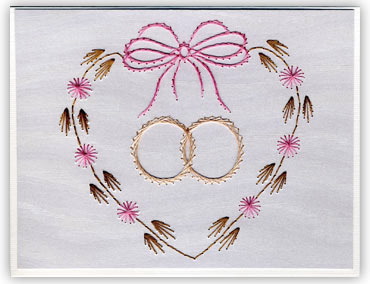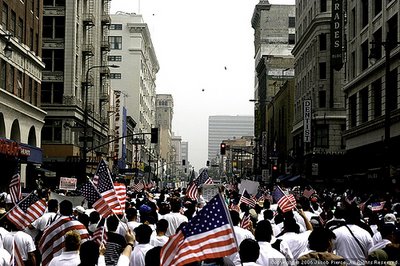caps off
OK, I'm just this geeky: One of my favorite discoveries of late is You Don't Say, the blog of John McIntyre, manager of the copy desk at The Baltimore Sun and former president of the American Copy Editors Society. Yup, we have our own society, one in which sensibly attired men and women meet annually to guffaw over misplaced modifiers and such. The society even runs an online discussion board, but I can't bring myself to post there for fear that I'll make a grammatical error and become the forum goat. I'm strictly a bush-leaguer in the copyediting ranks, and I can only aspire to the speed and grace with which ACES types can turn around flawless copy. I bow at their temple.
But I like McIntyre's take on copyediting precisely because he's damn near democratic in the exercise of his craft. He never insists upon a rule of usage simply because it's a rule, and he's given to a fair amount of flexibility when it comes to our evolving language and conventions. Sure, he wears a bow tie, but he's not a stuffed shirt: In a recent entry he says, “Copy editors tend to be strongly binary. Everything in usage should be reducible to a rule. But experience is messy, and language mirrors experience. In reaching for precision, it is easy to overreach.”
How great is that? It reminds me of the day I realized math could be creative: It's not like I then ran out and changed my major, but my worldview shifted slightly and resettled in a more pleasing manner.
An evolving language is necessary to keep up with the speed of invention. Our copy chief only recently gave over to "blog" as an acceptable, stand-alone term in place of Web log. “Web log” itself wasn't such a cumbersome term to use, but the outlawing of “blog” made “blogging” and “blogger” verboten as well. “The blogger blogged to her blog” became “The writer of the online journal added an entry to her Web log.” As ridiculous as the former sentence sounds, the latter is downright stiff. And we copy editors are always on the defensive about that s word.
I am pretty rigid, as my partner would no doubt attest, and the most difficult lesson I've had to learn and am still learning on my job is when to exercise restraint. I came to copyediting from a creative writing background, and despite that word creative, I had definite ideas about how words should “flow.” How to convince me, then, that a sentence that reads like an out-and-out dog's breakfast to me could seem positively poetic to its writer? That that could be the one sentence the author reads in the finished magazine that makes him say, “Hey, that's not the way I wrote it!”
(I've wanted to employ the phrase “dog's breakfast” ever since I first noticed its entry in my desk dictionary. I was intrigued enough then to stop and read its definition, and it's one of those words I always notice as I flip through the pages. It's evocative in the way British slang so often is—meaning “confused mess,” just as you might expect—and I'm pleased to have been able to deploy it here. Thank you for indulging me.)
Books and articles I edited early in my copyediting career were awash in red ink, and I was secretly pleased with myself for having made them bleed. If I were being paid by the correction, I could have taken an early retirement. But I'm mellowing with experience, even if to hear my partner tell it I'm an inky tyrant. This weekend she asked me to look over the c.v. and cover letter she's submitting to apply for the job she already has: She's hoping to get that pesky “interim” excised from her title. I was making my way through her pages of degrees, publications, and honors—the kind of academic cred I'd be hard-pressed to fill a single page with myself—when she looked over my shoulder and said, “Oh, my God! Is it that bad?”
I didn't think it was bad in the least, though when I looked at the page before me there were quite a few red marks. “That's just punctuation stuff,” I said.
“But I've been showing that to people!” she said, a little panicked.
“Believe me,” I assured her. “This is the kind of stuff only a copy editor would notice.”
 That's the thing about copyediting: It must be a labor of love, because the work is invisible to all but a handful of people. A book I worked on about a year ago just won an award, and I had a quiet moment during which I patted myself on the back, but I don't expect to be thanked by the author. If I do my job well, the author won't see my footprints: When she reads the final draft she recognizes every word as her own, every sentence just as she arranged it, and that's as it should be.
That's the thing about copyediting: It must be a labor of love, because the work is invisible to all but a handful of people. A book I worked on about a year ago just won an award, and I had a quiet moment during which I patted myself on the back, but I don't expect to be thanked by the author. If I do my job well, the author won't see my footprints: When she reads the final draft she recognizes every word as her own, every sentence just as she arranged it, and that's as it should be.
So we fight the good fight quietly, because what it would take for copy editors to get noticed is unconscionable: putting our pens on strike and flooding the world with the typos, gaffes, and confusing punctuation of a nation too proud to proofread and too rushed to care. The horror…the horror…
Besides, you have only to read McIntyre's You Don't Say, or Capital Idea, by Nicole Stockdale of The Dallas Morning News, or Blogslot, by The Washington Post's Bill Walsh, to understand that these folks do what they like and like what they do, and is there really anything more life-affirming than that?
Hey, kids, want to make your own bogus newspaper clipping? Click here. It's way superfun!
But I like McIntyre's take on copyediting precisely because he's damn near democratic in the exercise of his craft. He never insists upon a rule of usage simply because it's a rule, and he's given to a fair amount of flexibility when it comes to our evolving language and conventions. Sure, he wears a bow tie, but he's not a stuffed shirt: In a recent entry he says, “Copy editors tend to be strongly binary. Everything in usage should be reducible to a rule. But experience is messy, and language mirrors experience. In reaching for precision, it is easy to overreach.”
How great is that? It reminds me of the day I realized math could be creative: It's not like I then ran out and changed my major, but my worldview shifted slightly and resettled in a more pleasing manner.
An evolving language is necessary to keep up with the speed of invention. Our copy chief only recently gave over to "blog" as an acceptable, stand-alone term in place of Web log. “Web log” itself wasn't such a cumbersome term to use, but the outlawing of “blog” made “blogging” and “blogger” verboten as well. “The blogger blogged to her blog” became “The writer of the online journal added an entry to her Web log.” As ridiculous as the former sentence sounds, the latter is downright stiff. And we copy editors are always on the defensive about that s word.
I am pretty rigid, as my partner would no doubt attest, and the most difficult lesson I've had to learn and am still learning on my job is when to exercise restraint. I came to copyediting from a creative writing background, and despite that word creative, I had definite ideas about how words should “flow.” How to convince me, then, that a sentence that reads like an out-and-out dog's breakfast to me could seem positively poetic to its writer? That that could be the one sentence the author reads in the finished magazine that makes him say, “Hey, that's not the way I wrote it!”
(I've wanted to employ the phrase “dog's breakfast” ever since I first noticed its entry in my desk dictionary. I was intrigued enough then to stop and read its definition, and it's one of those words I always notice as I flip through the pages. It's evocative in the way British slang so often is—meaning “confused mess,” just as you might expect—and I'm pleased to have been able to deploy it here. Thank you for indulging me.)
Books and articles I edited early in my copyediting career were awash in red ink, and I was secretly pleased with myself for having made them bleed. If I were being paid by the correction, I could have taken an early retirement. But I'm mellowing with experience, even if to hear my partner tell it I'm an inky tyrant. This weekend she asked me to look over the c.v. and cover letter she's submitting to apply for the job she already has: She's hoping to get that pesky “interim” excised from her title. I was making my way through her pages of degrees, publications, and honors—the kind of academic cred I'd be hard-pressed to fill a single page with myself—when she looked over my shoulder and said, “Oh, my God! Is it that bad?”
I didn't think it was bad in the least, though when I looked at the page before me there were quite a few red marks. “That's just punctuation stuff,” I said.
“But I've been showing that to people!” she said, a little panicked.
“Believe me,” I assured her. “This is the kind of stuff only a copy editor would notice.”
 That's the thing about copyediting: It must be a labor of love, because the work is invisible to all but a handful of people. A book I worked on about a year ago just won an award, and I had a quiet moment during which I patted myself on the back, but I don't expect to be thanked by the author. If I do my job well, the author won't see my footprints: When she reads the final draft she recognizes every word as her own, every sentence just as she arranged it, and that's as it should be.
That's the thing about copyediting: It must be a labor of love, because the work is invisible to all but a handful of people. A book I worked on about a year ago just won an award, and I had a quiet moment during which I patted myself on the back, but I don't expect to be thanked by the author. If I do my job well, the author won't see my footprints: When she reads the final draft she recognizes every word as her own, every sentence just as she arranged it, and that's as it should be.So we fight the good fight quietly, because what it would take for copy editors to get noticed is unconscionable: putting our pens on strike and flooding the world with the typos, gaffes, and confusing punctuation of a nation too proud to proofread and too rushed to care. The horror…the horror…
Besides, you have only to read McIntyre's You Don't Say, or Capital Idea, by Nicole Stockdale of The Dallas Morning News, or Blogslot, by The Washington Post's Bill Walsh, to understand that these folks do what they like and like what they do, and is there really anything more life-affirming than that?
Hey, kids, want to make your own bogus newspaper clipping? Click here. It's way superfun!



